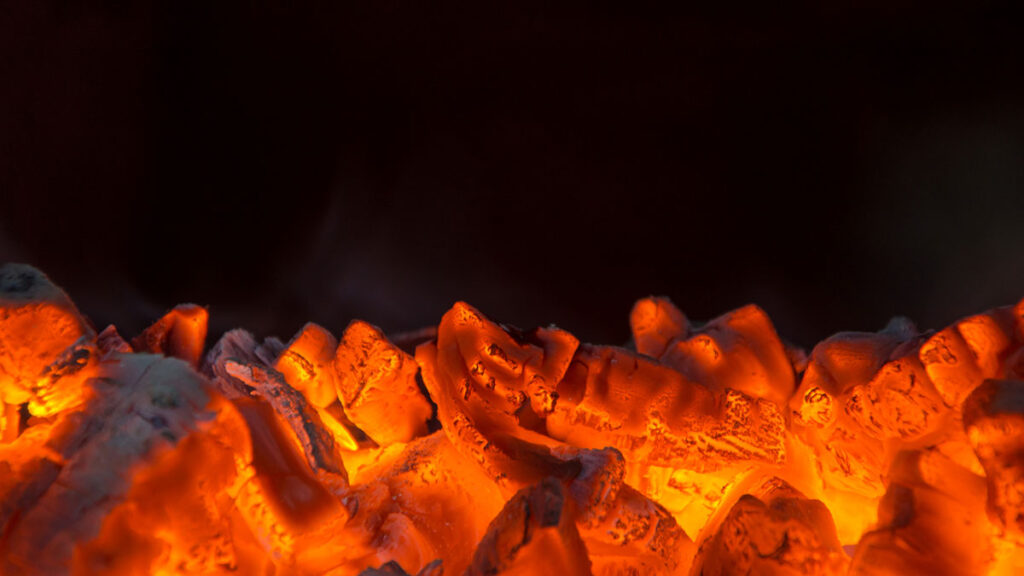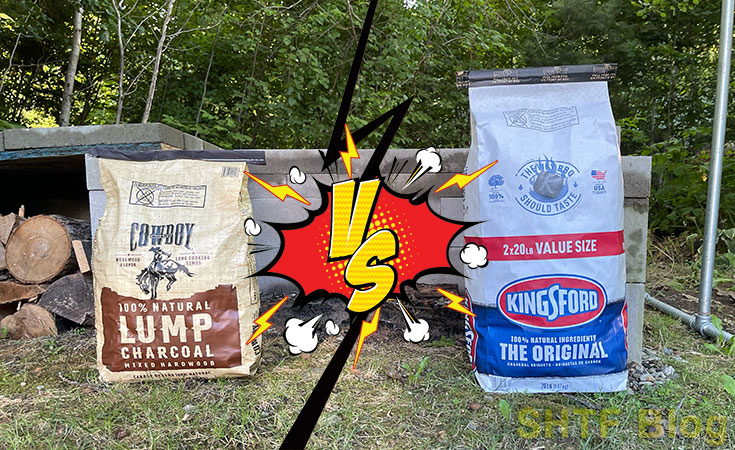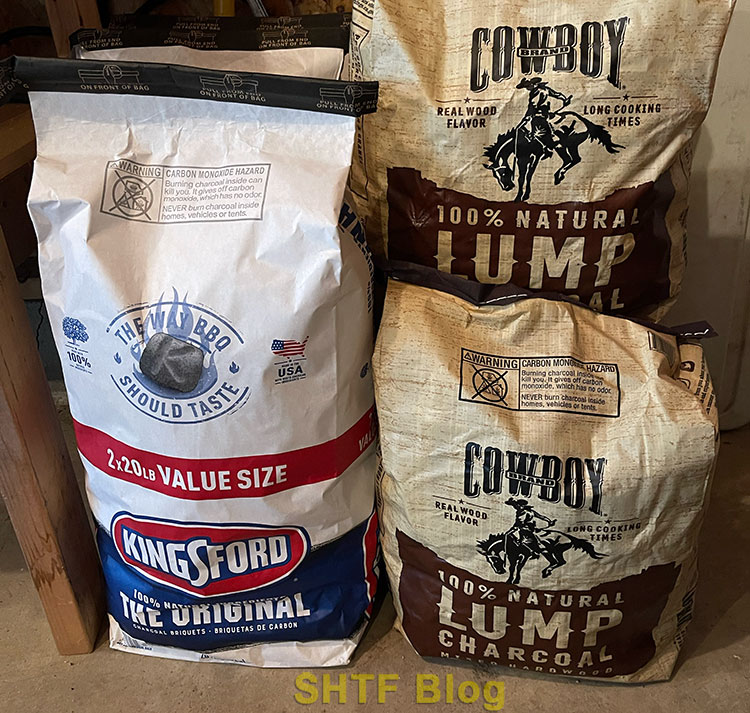
Charcoal has been an affordable and valuable energy source for centuries. Today it plays a vital role in summer barbecues and, in some less developed countries, generating heat during chilly winter months.
Barbecue enthusiasts might be wondering about charcoal shelf life as they dust off their barbecues each spring and assess left over charcoal from the year before. Preppers might be wondering about how to store charcoal for possible grid-down situations that might require outdoor cooking and the fuel to make it happen.
One study from the Department of Earth and Environmental Science, University of Pennsylvania described charcoal this way:
Around the world, charcoal has persisted as an energy resource and retained unequivocal dominance in the energy consumption mix of some nations many years on since modern alternatives were invented. Furthermore, it has secured unyielding significance as a commodity on local and international markets and remained an aggressive competitor to electricity and gas for cooking.
https://www.mdpi.com/2079-9276/8/4/183/htm
Preppers with ample storage space might be wise to store charcoal for the long-term, particularly if they already have a taste for, and the skills to use, charcoal-based cooking.
While charcoal is readily available by just strolling into a store and purchasing some, you are responsible for preserving them so that they retain their efficacy. This guide will assist you in understanding the charcoal shelf life and the ideal storage options for keeping it safe for an extended period.
Table of Contents
Charcoal vs Charcoal Briquettes
Before we get into shelf life and storage options, it’s important to distinguish between charcoal and charcoal briquettes. While similar, they’re not the same. The big difference between charcoal and charcoal briquettes is the chemical additives in charcoal briquettes.

Charcoal is a natural product from burning wood or fallen trees, generally hardwood, in a low-oxygen environment with high heat. Charcoal is also known as “lump wood charcoal,” and the process of its creation requires no chemicals or additives. While charcoal briquettes follow the same process of creation as charcoal, the materials used are different, and after the burning, chemicals and additives are added to the mixture.
Charcoal briquettes, on the other hand, are made from compressed sawdust and wood particles with added chemicals to facilitate combustion and control burn rates. Examples of these additives and chemicals are limestone, starch, borax, etc.
Charcoal is known to have irregular shapes as both the size and shape of each piece are distinctive. Charcoal briquettes have regular uniform shapes, one feature you can use to differentiate between them. Due to the irregularity of the shapes, charcoal can require more storage space than charcoal briquettes.
While charcoal and charcoal briquettes are both fuel sources, they each have different uses. Charcoal burns fast, but the warmth lasts just a short time. This makes direct barbecuing an excellent use for it. For example, lean, delicate steaks like filet mignon will benefit from a brief sear over a lump of wood charcoal heat to produce their most refined flavors.
Charcoal briquettes require more time to burn, but their temperature remains constant. As a result, indirect grilling and smoking are their major uses. Lump wood charcoal is superior for high-heat searing and grilling and adds excellent flavor. Briquettes are preferable for regulated, low, and gradual smoking.
Charcoal Shelf Life
Charcoal does not expire or deteriorate over time as long as it is not exposed to moisture, heat, or dirt.
Lump wood charcoal generally has an average of 2- 3 hours of burn time because it does not contain chemicals and additives. While it has a shorter burn time compared to charcoal briquettes, It normally burns at a temperature of at least 1400 °F (760 °C), which is far hotter than what can be reached with charcoal briquettes.
You should rest assured that, as long as it hasn’t absorbed too much moisture, 100% natural charcoal without any additives or chemicals will still burn properly after a long period of time.
Charcoal Briquette Shelf Life
Typical charcoal briquettes have an endless shelf life so long as they are stored in a cool, dry environment. The exception to this are briquettes that contain mesquite and specialty “match light” charcoal briquettes. These specialty briquettes have a use by date of 1 to 2 years if stored correctly. If left to the elements they will deteriorate more quickly due to the added solvents evaporating.
While charcoal has a longer shelf life than charcoal briquettes, charcoal briquettes burn longer than charcoal. The average burn time for 2 kilograms of charcoal briquettes is 5 hours, but there are several variables that can affect this time, such as the type and material of the equipment being used and the quantity and quality of the charcoal briquettes used.
You must also consider environmental elements such as the outdoor temperature and wind.
Best Way to Store Charcoal
According to scientific research on the subject, charcoal is a porous, light-weight carbon residue. It quickly absorbs moisture when in close contact with a damp surface or when exposed to damp air. If you expose a bag of charcoal or charcoal briquettes to the air and they become moist, the charcoal briquettes will go bad and become unusable. Lump wood charcoal may be spread out and dried when it has already come into contact with moisture to be reused.
You should use waterproof containers in a cool, dry place to store charcoal.
There are a few crucial aspects to consider while looking for a location to store your charcoal storage container. Your storage containers should not be in moist areas and should be kept out of direct sunlight. A cold and dry garage or barn is best for storing charcoal.

If you’re keeping charcoal in a container outside, keep it raised off the ground. If you can only store your charcoal in your basement because you don’t have a garage or an outdoor shed, use a dehumidifier to eliminate the extra moisture in the air.
5 Best Charcoal Storage Containers
There are several ways to store charcoal and charcoal briquettes as long as they are kept dry, cool, and free of excessive pressure, but one of the best is to use designated storage containers. While there are specific charcoal storage containers, there are some out-of-the-box ideas you can implement to get your own charcoal storage container.
1) Kingsford Charcoal Dispenser
This purpose-built container holds charcoal upright and allows for easy dispensing of the charcoal. It is made of plastic, which is waterproof, corrosion-proof, and enables an airtight closure between the lid and container body, so it is a great storage option for charcoal needs.
The dispenser also features a handle, making it convenient to dump charcoal out. The cover locks in place, ensuring that your charcoal remains dry, cool, and ready for use when required. The black color also blocks out light.
- Large Capacity - Our Kingsford Charcoal Container holds up to 10 lbs of charcoal briquettes or 20 lbs of wood pellets. This charcoal storage bin is smoking and grilling necessity
- Weatherproof Design - The rainproof lid keeps charcoal or wood pellets fresh, dry and ready to use. These handy air tight containers make great storage when space is limited.
What I don’t like about this container is that it’s limited in size. It’s great for convenient use/dispensing of charcoal, but it’s not a very affordable way to store large quantities of charcoal.
2) Metal Trash Can
These cans are an excellent alternative to charcoal dispensers. Metal is not as porous as plastic and is resistant to heat and fire. This is an excellent alternative for people who want to store a lot of charcoal, and you might already own one that you can use.
Good for preppers to know, these cans can also be converted into homemade Faraday cages.
- Durable Construction: Made from stainless steel for long lasting use
- Large Capacity: 20 gallon trash can holds a significant amount of waste
It is advisable to line the inside of the can with a garbage bag since metal trash can lids do not create an airtight seal when in contact with the container body. This extra caution lowers the possibility of moisture in the air reaching your charcoal and interfering with its effectiveness.
The downside to these containers is that they can rust out if left on a moist surface. Therefore, raising metal cans a few inches above the ground is important in potentially damp areas.
3) 5-Gallon Plastic Pails
The standard plastic pail is a good, low-cost option for storing charcoal and charcoal briquettes. Just make certain that you get a proper fitting lid. Pails can be used to segregate various sizes of charcoal or to fill with briquettes. They are waterproof and have airtight seals (with a proper lid).
Despite their small size, they are decent options for storing bulk charcoal because you can stack them. To keep humidity at bay, use an airtight plastic bucket and seal it shut with glue or a gamma lid if you’re unsure whether it’s airtight.
4) Plastic Trash Cans with Wheels
These big containers are a popular choice among regular barbecuers. These make it simple to move large quantities of charcoal around. You may select the size that best meets your needs from various airtight, weatherproof, and size options.
No products found.
The obvious downside to these are their size. They’re big.
5) Plastic Storage Bins
These also make an excellent choice for folks who use smaller amounts of charcoal. Many people have some already and they can sometimes be found cheap at yard sales.
- Made in the USA with Lifetime Warranty: Proudly made in the USA, these storage bins come with a lifetime warranty, guaranteeing high quality and long-lasting durability.
- Versatile Storage Solutions: Perfect for attics, basements, garages, and more, these storage bins are ideal for storing large items, holiday decorations, heavy tools, sports equipment, camping gear, craft supplies, and blankets.
They are stackable, but be careful if you are using these to stack large amounts of charcoal as the weight could become significant if the totes are stacked too high on top of one another. They’re not made for bearing weight, just storing items.
Charcoal FAQs
Can you reuse old charcoal?
Yes, you can reuse old charcoal as long as it has not crumbled into bits. The unburnt charcoal is just as good as fresh charcoal you haven’t used.
Can I grill with damp or wet charcoal?
As long as the charcoal hasn’t turned to dust and you’ve taken the time to let it dry in the sun, you may grill using wet charcoal. Charcoal briquettes are more apt to be compromised by dampness, however.
How do I dispose of old charcoal briquettes?
First, soak the old charcoal briquettes in water for an hour to dispose of them. After you are done, wrap the soaked charcoal briquettes in a non-combustible material or container. Then you throw it in the normal bin. However, given that they have a virtually endless shelf-life, just use them instead!
How Much Charcoal Should Preppers Stock?
This is an impossible question to answer for you. It’s something you have to figure out based on your available storage space, how many people you hope to cook for, and for how long.
If you have some experience cooking with charcoal then you should have an idea on how much charcoal is needed for each meal you make for yourself or your family. Then you can project how much charcoal is needed for the number of days you’re preparing for.
Diversity is key when prepping. I store charcoal because I like cooking with it, but also because it adds diversity to my fuel sources. I have propane, firewood, and charcoal. Between storing those 3 fuel sources, I am creating plenty of options for grid-down cooking.
Summary
We considered two major factors when comparing charcoal with briquettes: price and function. Briquettes are inexpensive and easy to use, but they do not create very high temperatures and produce a lot of ash and smoke upon ignition. Charcoal, on the other hand, is more expensive than charcoal briquettes but makes much better barbecuing conditions because of its high heat levels and cleaner burn.
The good news is that either type (with the exception of mesquite and easy burn briquettes), the shelf-life is virtually endless. That should bring a smile to every prepper’s face!



